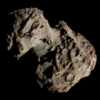D/1895 Q1 (Swift)
| Discovery[1] | |
|---|---|
| Discovered by | Lewis A. Swift |
| Discovery site | Mount Lowe Obs. |
| Discovery date | 24 August 1895 |
| Orbital characteristics[2][3] | |
| Epoch | 25 August 1895 (JD 2413430.5) |
| Observation arc | 166 days |
| Number of observations | 182 |
| Aphelion | 6.1609 AU |
| Perihelion | 1.2978 AU |
| Semi-major axis | 3.7293 AU |
| Eccentricity | 0.9725 |
| Orbital period | 7.2 years |
| Inclination | 2.9923° |
| 171.75° | |
| Argument of periapsis | 167.78° |
| Last perihelion | 21 August 1895 (observed) 17 February 2019 (calculated) |
| Next perihelion | 19 September 2026 (calculated) |
| TJupiter | 2.677 |
| Physical characteristics[4] | |
| 13.0 (1895 apparition) | |
D/1895 Q1 (Swift) is one of 13 comets discovered by American astronomer, Lewis A. Swift. A Jupiter-family comet, it was last seen in February 1896 and was not observed since.[1]
Possible encounter with Mariner 4
[edit]On September 15, 1967, the Mariner 4 spacecraft encountered a dense "meteor storm" that is more intense than anything seen from Earth for 45 minutes, which may have damaged bits of insulation and temporarily changed the attitude of the spacecraft.[5][6] What caused it remained a mystery until in 2006, astronomer Paul Wiegert examined old comet data and found that Mariner 4 would have been 20 million km (12 million mi) from the possibly shattered nucleus of D/1895 Q1 (Swift).[1] However, Wiegert noted that the comet's orbit during its 1895 apparition wasn't precisely known, leading to a large potential error in the comet's expected location in 1967.
See also
[edit]References
[edit]- ^ a b c G. W. Kronk. "D/1895 Q1 (Swift)". Cometography.com. Retrieved 30 October 2024.
- ^ "D/1895 Q1 (Swift) – JPL Small-Body Database Lookup". ssd.jpl.nasa.gov. Jet Propulsion Laboratory. Retrieved 30 October 2024.
- ^ S. Yoshida (11 March 2019). "D/1895 Q1 ( Swift )". Retrieved 30 October 2024.
- ^ E. Frisby; G. A. Hill (1895). "Observations of comet 1895a". Astronomical Journal. 15 (357): 174–175. Bibcode:1895AJ.....15..174F. doi:10.1086/102311.
- ^ T. Phillips (23 August 2006). "Mariner Meteor Mystery, Solved?". science.nasa.gov. NASA. Archived from the original on 6 April 2009. Retrieved 11 February 2009.
- ^ T. Phillips (24 August 2006). "Has the Mariner Meteor Mystery Been Solved". Mars Daily. Retrieved 11 February 2009.
External links
[edit]- D/1895 Q1 at the JPL Small-Body Database


